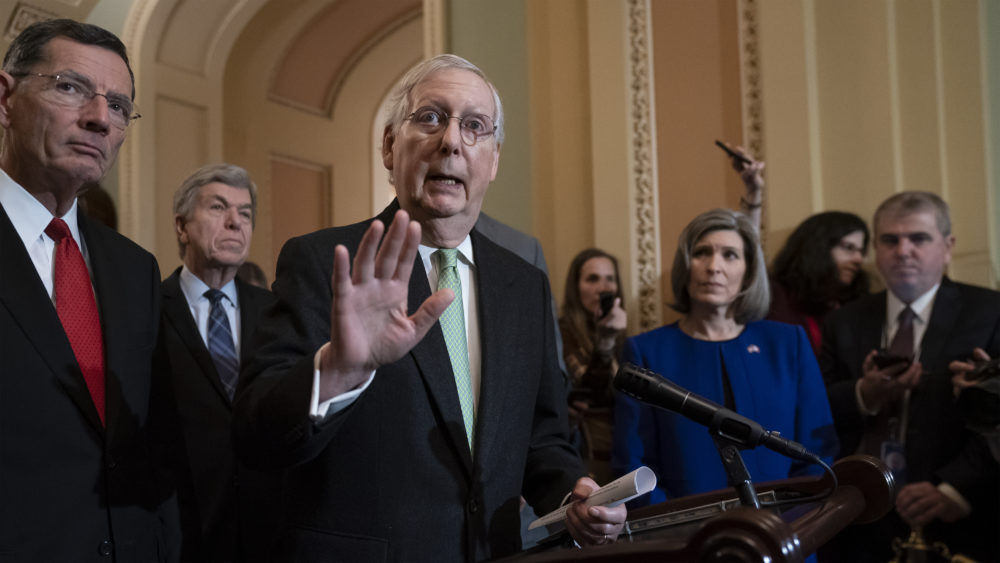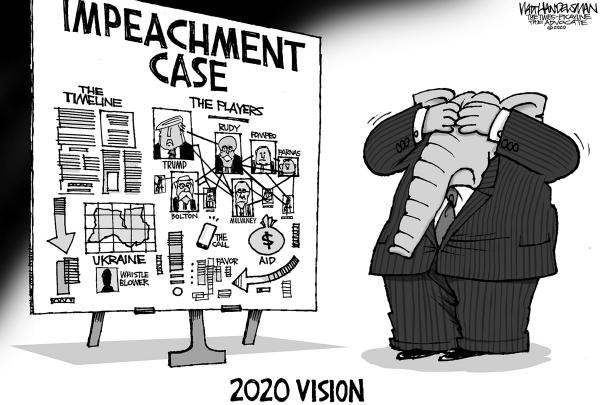I mostly agree with what E.J. Dionne writes today, although I have some quibbles. In Progressives and moderates: Don’t destroy each other — The enemy is Trump, not Clinton or Obama, Dionne writes,
The Democratic campaign was destined to entail an argument about the party’s direction for the next decade. Is this election about restoration, after the madness of Trump’s time in office? Or should the accent be on transformation, to grapple with the underlying problems that led to Trump’s election in the first place? …
… Like so many of the binaries in politics, the restoration/transformation optic captures something important but is also a false choice. The country can’t simply pick up where it left off before Trump took office. The radicalized conservatism that dominates the Republican Party will not go away even if he is defeated. The inequalities of class and race that helped fueled Trump’s rise have deepened during his presidency. You might say restoring the norms that Trump threatens requires transformation. And the majority that opposes Trump is clearly seeking a combination of restoration and transformation. They want to bring back things they believe have been lost as a prelude to moving forward. What they want most to restore is progress.
I think this is true. While many people who aren’t politics nerds may be skeptical of Medicare for All or a Green New Deal, they do know they want change. People are frustrated out of their minds, and have been for many years, with government that takes their taxes but doesn’t ever seem to do anything for them. And I think that’s true across the political spectrum. Where we differ is how we understand the source of the problem. Leftists tend to blame massive corruption and the influence of big money. Those on the Right appear to have more amorphous fears of foreigners, racial minorities, and multiculturalism.
Progressives and moderates need to realize that at this moment in history, they share a commitment to what public life can achieve and the hope that government can be decent again. They reject overt appeals to racism that have been Trump’s calling card and an approach to politics based on dividing the nation. Together, they long for a politics focused on freedom, fairness and the future.
Let’s assume for now this is true.
What should bring moderates and progressives together is an idea put forward long ago by the late social thinker Michael Harrington: “visionary gradualism.” The phrase captures an insight from each side of their debate: Progressives are right that reforms unhinged from larger purposes are typically ephemeral. But a vision disconnected from first steps and early successes can shrivel up and die. Vision and incremental change are not opposites.
I have developed an allergy to the word “incremental.” In theory, it sounds reasonable. In practice, it means not challenging the status quo at all but settling for minor tweaks to policies that need serious overhaul. At this point whenever some candidate extols the virtues of “pragmatism” and “incremental change,” I hear, but don’t expect me to do shit. Perhaps lip service is paid to what a glorious thing we might do “some day,” but some day never arrives.
And one reason some day never arrives is that the Democratic incrementalists are so lacking in vision they aren’t leading anyone anywhere. They win an election and maybe undo some of the damage the Right has done, and they call that a success. And then in the next election cycle the frustrated public votes for the Right again.
This is the pattern we’ve been dealing with for a long time. If Republicans screw up enough Democrats may win the White House and even hold a majority in Congress for a brief time, and then in the next election the Right will take Congress back because voters are still frustrated with the status quo and Democrats don’t seem to be addressing those frustrations. And every Republican administration that has taken the White House back from the Democrats has been more extreme and more corrupt than the last one. This is the pattern that’s got to stop. But it won’t stop as long as the “restorationists” and “incrementalists” are in complete charge of the Democratic party and refusing to listen to those who want change to start happening now, not some day.
What about the progressives, or “transformationists” as Dionne calls them? Although my sympathies are with them, many have naive ideas about how, and how quickly, transformation can happen even if Their Favorite Presidential Candidate is elected president. Presidents have no Constitutional power to write and pass laws that make transformational change, in spite of what Donald Trump thinks. The next Democratic president may push Congress in a more progressive direction, or not, but ultimately what we’ll get is what Congress passes, not necessarily what the President promised as a candidate. I agree with what Paul Walman wrote here:
Whether you think a social democratic revolution of the kind Sanders promotes is good or bad, the realities of Congress will make it impossible to bring about. In fact, if Sanders is elected, the major policy contours of his presidency will be nearly identical to those of almost any other Democrat.
That’s true to a great degree of Warren as well (though she has done more thinking about how to use regulatory power to achieve progressive ends). And to be clear, I’m not saying the individual in the Oval Office doesn’t matter. There will be differences in what they prioritize, whom they put into key executive branch positions, and how they react to crises.
But on the big picture, any Democratic president will do most of the same things.
Consider health care. Sanders wants immediate passage of what would be the most generous single-payer system in the world. So what will happen when he puts out that plan?
The answer is: basically nothing. Sanders believes he can pass Medicare-for-all through reconciliation, which requires only 50 votes instead of the 60 needed to overcome a GOP filibuster. But even if Democrats take the Senate, the absolute best-case scenario would get them 52 seats. And not only aren’t there 50 Senate votes for Medicare-for-all, there probably aren’t even 40 votes. Maybe not even 30.
So what does a President Sanders do then? If history is a guide, he’ll compromise. For all we think about Sanders as a purist ideologue, in the Senate he has been happy to support things he considered half-measures, such as the Affordable Care Act, when it mattered. He has always had a pragmatic side. So after Medicare-for-all failed, he’d probably say, “Okay, let’s start with a public option.”
In fact, at that point he’d probably take the position Warren has during the campaign: Do a public option first, and if it works well, in a few years the public and Congress will be more open to Medicare-for-all. And every other Democratic candidate, including “moderates” such as Joe Biden and Amy Klobuchar, has also committed to pushing a public option. We don’t know whether that can pass either, but any one of the Democrats would wind up in the same place.
I know this isn’t what many Sanders supporters want to hear, but what Waldman describes is far more likely than any scenario in which Medicare for All becomes the law of the land in 2021. And this is why all the trashing of Liz Warren’s “gradual” plan and screaming that she “sold out” on Medicare for All is seriously stupid.
As Will Short wrote recently, candidates’ policy plans need to be taken seriously but not literally. “Whatever is typed in a report in 2019-20 won’t be what emerges from the sausage grinder of Capitol Hill,” he wrote. What’s important is that our leaders have a clear vision of the transformation change that is needed and will keep pushing to get us there. Some of our more moderate, “incrementalist” candidates fall short in that regard, I fear, although of course they’d still be a huge improvement on Trump.
However, if we achieve victory in November, and take back the White House and both houses of Congress, if the tweakers remain in charge be prepared to lose Congress again in the 2022 midterms. (I don’t even want to think about what will happen if Republicans keep control of the Senate, frankly.)
A transformationist president could use the bully pulpit of the presidency to sell people on the benefits of transformational change. In that case, some day might arrive before the end of this decade instead of never.
That may be frustrating to the young folks, but most of you young folks will still be here at the end of this decade. Will change be happening then, or will you still be butting your head against the same wall? This really is up to you. If Millennials voted at the same rate as us geezers, the U.S. would be reborn.
Dionne goes on to consider the difference between “shrewd pragmatists” and “unprincipled sellouts.” Often that difference is in the eye of the beholder. Barack Obama, for example, got some things right but failed in other ways. His administration was successful in many ways, but some of what he failed to do helped set us up for Trumpism. This is something the incrementalists, and the current Democratic Party establishment, need to acknowledge instead of treating the Obama Administration as some kind of golden age.
Dionne’s column ends with his account of a meeting with the Third Way organization, which emerged from the neoliberal New Democrats of the 1980s and 1990s. Third Way has been a stone around the neck of the Democratic Party for at least two decades now, and frankly I want to round them all up and deport them. These are people who want to enshrine the status quo in marble, in the name of “bipartisanship.” But surprisingly, even the executive vice president of Third Way, Matt Bennett, admitted to Dionne that the New Democrats had been wrong about some things.
“We need to be working to tame capitalism at this moment, because it is not functioning well,” Bennett told me. “We need to do in this century what the progressives and New Dealers did in the last century.”
Yes, thank you, Captain Obvious. But for a Third Way guy to admit that maybe capitalism needs taming is evidence that the messaging of Bernie Sanders and Liz Warren is breaking through their thick heads. And that’s something.
What I’m asking for here is for all of us to be both more visionary and more pragmatic.
The “centrists” need to understand that their lack of vision and tone deafness to voter frustration has a lot to do with their failures to win certain demographic groups (see: Hillary Clinton, 2016). To beat Trump a centrist candidate will need the votes of progressives, so bashing them throughout the primaries will hurt you in the general. If a centrist Democratic candidate wins the White House, that person needs to bring progressives into the cabinet and take their views seriously, or else Dems will continue to play defense and the next Republican president really will be Mussolini and not just a moronic wannabe.
And I’d say a lot of the progressives need to be more pragmatic, or at least realistic, and understand that there really aren’t enough progressive voters now to make all of our policy ideas popular and viable (although a big millennial voter turnout would help). To beat Trump and win the presidency, a progressive nominee will need the support of establishment Dems and the votes of skeptical centrists. So treating people who don’t see eye to eye with you in every detail as the “lesser of two evils” is not smart. Temper your rhetoric.
Political activists do tend to be passionate and opinonated, but as we get into the primaries please try to conduct yourselves in ways that don’t utterly alienate people whose votes and support Your Candidate, if nominated, will need in November. (And I’m looking right now at all you centrists who keep posting “Stop Bernie because he’ll lose” crap. That could backfire very badly. And the next time I see a Sanders supporter call for Liz Warren to drop out “because she can’t win,” that person will be blocked. I’m serious.)
Trust the process, and may the best candidate win.










